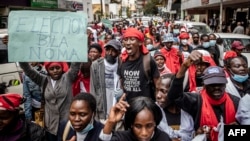The run-up to Kenya’s Aug. 9 elections has seen an increase in hate speech aimed at influencing voters, mainly through social media. Groups such as the U.S.-based charity Mercy Corps are running education campaigns to counteract such speech and raise awareness on misinformation and disinformation.
The inciteful comments are both online and at campaign stops ahead of the country’s general elections.
Research by the U.S.-based humanitarian group Mercy Corps finds a growing use of words that amount to hate speech and could spark violence, especially in the event of a contested election.
Charles Apondu, program manager for peace-building and conflict management at Mercy Corps in Kenya, said some speakers use code words in an effort to promote ethnic tension.
“There is the term Kihihi,” Apondu said. “Kihihi means uncircumcised male, basically terming them a child and unfit for leading. There is the use of the term fumigation, which sort of means target for the extermination of particular groups.”
The National Cohesion and Integration Commission, a body that promotes good relations and peaceful coexistence in Kenya, published a list of 23 words and phrases they say could spark intercommunal violence.
Some of the words call for communities not original to a specific area to leave.
Daniel Omondi is the head of the Global Peace Foundation Kenya office, which like Mercy Corps is trying to combat the rise in hate speech. He said he’s seen inflammatory speech on the campaign trail, though he shies away from predicting disaster.
“When you go to where people meet, there is a lot of tough speech, tough sloganeering,” he said. “But as a peace actor, I do not want to spread fear as a result of what is going on. It's just that our politics is strong, vibrant.”
Analysts say potential hot spots for election-related violence are Nairobi, the neighboring counties of Kiambu and Nakuru, Deputy President William Ruto's home county of Uasin Gishu and former Prime Minister Raila Odinga’s home, Kisumu County.
Political commentator Michael Agwanda said Ruto and Odinga are partially to blame for the tension in the country.
“People are deviating from real campaign slogans, philosophies and beliefs and development structures and getting too personal,” Agwanda said. “I think this is as a result of cues that they are getting from their presidential aspirants. And mainly, they tend to follow through what the leader says and what the leader believes in.”
In an effort to tamp down the tension, peace campaigners are mounting campaigns on social media and holding town halls to educate voters on how to get reliable information regarding the election.
Apondu said they are trying to demonstrate ways of resolving political issues besides violence.
“We are also using social media to create awareness on what are the available alternative dispute resolution mechanisms in the country other than resorting to protests, resorting to violence, or targeting each other's supporters,” Apondu said. “They need to know that we have a political party dispute tribunal. You can go to the courts. You can use internal party dispute resolution mechanisms.”
Previous Kenyan elections have been marked by violent protests and attacks on people because of their ethnicity. In the 2007 election, a disputed presidential poll sparked attacks that killed more than 1,100 people and displaced a quarter million from their homes.
Mercy Corps Says Hate Speech Spreading Ahead of Kenya's Election

Nairobi —



